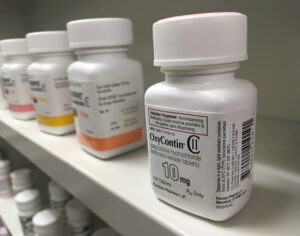
While drug and alcohol abuse among truck drivers has been a pressing concern in the industry for years, the latest substance abuse among truckers has taken the front seat; opioid use.

There has long been a problem with painkillers and other types of opioids in the United States. According to CNBC, approximately 80 percent of the global opioid supply is consumed in the U.S. As a result, politicians, advocacy groups and government organizations are coming together to enact stricter measures for prescribing pain killers.
U.S. Senator Pat Toomey of Pennsylvania stated, “When a problem is moving quickly, Congress is always going to be a little bit behind in catching up, but I feel like there’s a clear awareness now of how serious this problem really is.”
But exactly how serious is the problem?
America’s Opioid Addiction Turned Epidemic
According to the U.S. Department of Health and Human Services, each day an average of 3,900 people in the United States begin opioid use for non-medicinal purposes. Plus, an average of 580 people begin using heroin throughout the U.S. on a daily basis. It is clear that America’s opioid addiction has become an epidemic.
In 2014, more deaths were attributed to drug overdoses than any other year since statistics had been gathered. Of this record amount, the U.S. Department of Health and Human Services revealed that approximately 60 percent of the deaths involved the use of opioids. The opioid threat is growing every day in America, with inherent risks ranging from overdosing to driving under the influence.
The Different Risks Associated with Opioids
The Centers for Disease Control and Prevention reports that more than 1,000 people are treated in emergency departments every day for misusing prescription opioids, and approximately 91 Americans are dying daily due to opioid overdose.

The National Safety Council recently revealed a survey that showed approximately 99 percent of physicians exceeded the recommended three-day dosage limit, and as many as a quarter of these doctors were writing prescriptions for a full month supply at a time.
The misuse of opioids is especially damaging when these drugs fall into the wrong hands. Truck drivers have a responsibility to keep our roads safe by exercising precaution while behind the wheel of these 40-ton vehicles. When pain killers are involved, consequences are particularly grave.
The Effect of Opioids on the Trucking Industry
When a trucker drives impaired, not only is he a risk to himself, but also endangers everyone around him. Although trucking employees are mandated to test all drivers for drug use, opioid abuse among truck drivers continues to rise.
A typical truck driving drug test consists of a urinalysis that detects amphetamines, cocaine, marijuana and opioids. However, many argue that a urine test is far from accurate as urine tests detect drugs in body for a shorter period of time. Trucking industry leaders like the American Trucking Association, the Truckload Carriers Association and Alliance for Driver Safety & Security, are urging the Federal Motor Carrier Safety Administration to adopt a petition that would change the federally mandated drug testing policy from a urine analysis to a more accurate hair test. When the trucking company J.B. Hunt implemented hair testing in 2008, there was a significant reduction of positive drug test results among truck drivers.
Opponents of the petition, including the American Federation of Labor and Congress of Industrial Organizations, the Transportation Trades Department, the NAACP, ACLU and Drug Policy Alliance believe that hair testing is unreliable, ineffective, offers no federal oversight and is racially bias, as darker hair types can retain drugs longer than lighter hair types.
Whether you support the petition or not, most will agree that the opioid epidemic has become a serious problem in the trucking industry. Supporters and opponents alike continue to fight to find the best method for keeping our truck drivers sober and our roads safer for everyone.
